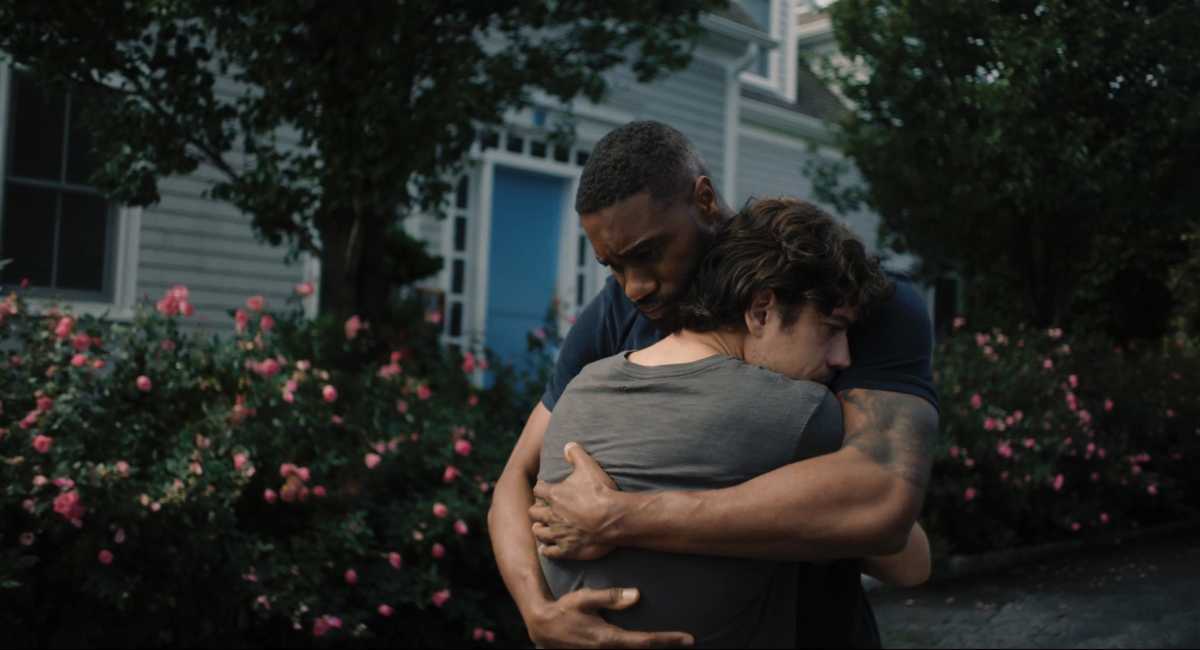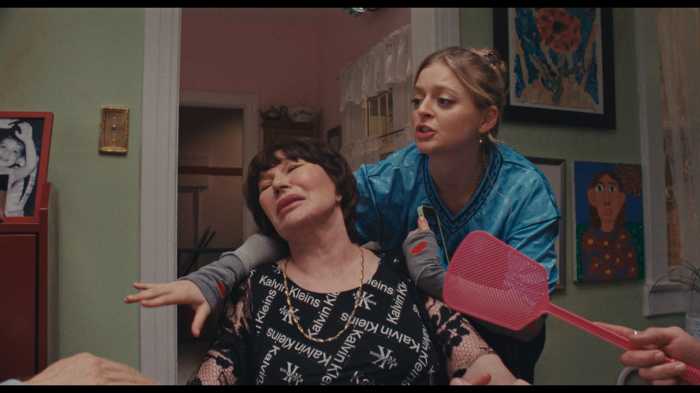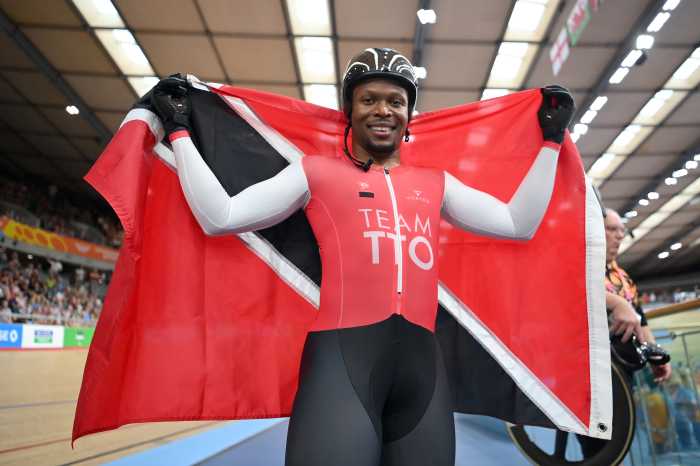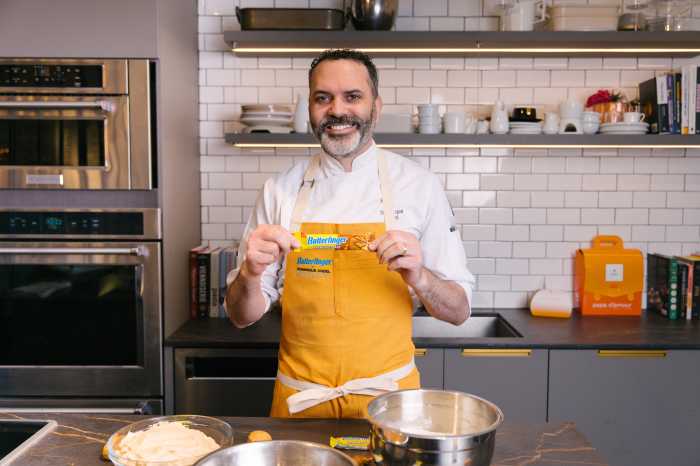“High Tide” is a bittersweet character study written and directed by Marco Calvani about Lourenço (Marco Pigossi, Calvani’s real-life husband), an undocumented Brazilian living in Provincetown during the late summer. Lourenço is depressed as he has recently been dumped by his lover, and has a month left on his visa. He feels that “his life is happening without him.” Things improve when Lourenço meets a tall drink of water named Maurice (James Bland) on the beach. The two men begin a respectful relationship, which buoys Lourenço’s spirits — but it may be short-lived.
Calvani gives Pigossi a terrific showcase, and the actor delivers a very affecting, ingratiating performance as a man struggling not to hit rock bottom. He is well matched with Bland, who is thoughtful and caring, and justly bristles at the various microaggressions he encounters. Beautifully filmed, and leisurely paced, the modest “High Tide” is a poignant romance about learning to love yourself.
The Marcos, Calvani and Pigossi, spoke with Gay City News about their “High Tide.”
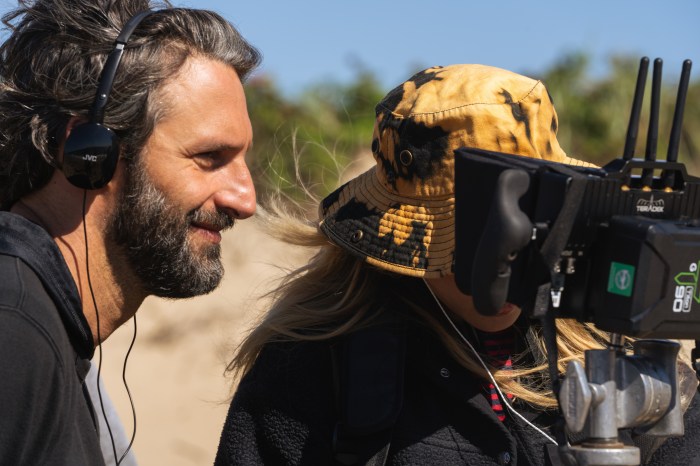
Lourenço is melancholic, he lacks confidence, he has hope, and behaves self-destructively. He is often uncomfortable in his own skin. Can you talk about how you approached his character?
Marco Pigossi: I had the script for almost two years and worked with Marco [Calvani] to bring specificities to it — what Lourenço is thinking here or there. We exchanged ideas and talked about the character, so when I got on set, I knew him inside out — his flaws and his beauty. I knew Marco’s vision of him. Yes, he is melancholic, yes, he is self-destructive, and yes, he is happy, and yes, he’s uncomfortable in his own skin, but aren’t we all? We all go through that when we are in this period of discovering ourselves and looking for a place to call home or find a sense of belonging. We are all searching, and we learn from our mistakes. That made him very human. He was silent outside even though the voices inside him were screaming. It was about finding truth in every moment.
Brazilians use the word saudade, which translates loosely as “longing.” This longing is conveyed through Lourenço’s experiences. What are your thoughts about this?
Marco Calvani: Lourenço came to this country to understand who he is and how to define himself. He left a version of himself back home, one that was not true. He doesn’t want to go back to Brazil because then he has to face all the ghosts and lies. He is not anchored by truth.
Marco Pigossi: He is trying to find his voice and who he is. Being an immigrant, when you move to another country, you try to find a new version of yourself. Who are you going to be in this place?
Both Lourenço and Maurice claim they feel like outsiders. What can you say about the depiction of issues of race, class, and identity?
Marco Calvani: I moved to Provincetown right after George Floyd was murdered. The conversation about systemic racism and injustices are at the center of things. Even though I was an outsider in my own privileged way, I was seeing things differently. Provincetown embraced me, but because of the time [the pandemic] and how I am formed and educated, I could see it wasn’t an experience equal for everyone. That informed the script. I think of the scene with Lourenço meeting with the lawyer (Bryan Batt). Lourenço doesn’t speak, but there is so much violence in that scene. People laugh at it until they realize how much abuse there is in the microaggressions.
But there is a tenderness Lourenço has with Maurice that offsets the difficulties he experiences outside that relationship. Can you discuss that?
Marco Pigossi: Lourenço is discovering feelings he didn’t have to deal with before. This film is a celebration of intimacy, and when you become intimate with someone, that’s when you discover your real self. That’s what Lourenço and Maurice find in each other. They figure out who they can really be.
Marco Calvani: I struggle so much to find value in intimacy. We all dream of it, but the gay community doesn’t promote it. You have to be defined way you look, dance, or have sex with…
Let’s talk about gay relationships. The film depicts hookups and queer friendships as well as dating. What observations are you making about gay men?
Marco Calvani: I feel lucky to be a gay man. I am privileged to be part of a community which taught me a lot and made me feel included at times, but it is also a community that almost killed me — not physically, but the violent energy of going out, in every sense. Gay men are men, and men are human beings, full of defects and faults. This defines Provincetown itself. It’s a wonderful community, but not all people are the same. Just because we are all gay, we are not all driven by same values. I would love to tell you since we’re a minority, we are democratic, and inclusive, and understanding. We are way more than others, but it’s not perfect.
Marco Pigossi: Going back to intimacy, the period of time all we are living in, the connections are fluid and online and we lean into that. We have an app — he’s a top? No. He’s a bottom? No. The cock looks like this — I don’t like it… There is no intimacy anymore. There is no meeting the person. It became a menu of options of what you project instead of getting to know each other and falling in love. We live in a time where there is so much information, and speed of relationships are so fast that it’s “liquid love.” Instead of connecting being a bridge between people, it creates a barrier to get to know someone. You miss the opportunity to meet someone amazing and to learn and grow.
Marco Calvani: I am not sure if I wrote this because I was in need of transformation, or if I was going through transformation and I found my way into writing this. I am very far, biographically, from Lourenço, but I connect with jumping into something bigger with your whole self and finding your purpose as a gay man at a time when everything is fragile and vulnerable and finite.
Marco, can you talk about your visual approach to the film? You shoot several scenes in closeup which magnify the emotions, but also use wider framing to convey ideas of isolation.
Marco Calvani: I really wanted to be close to the characters as much as possible. What they say is not what they think, or they say nothing at all. I needed to understand what they were feeling. I wanted people to perceive the attraction between Maurice and Lourenço. But I also wanted for Maurice and Lourenço to be together in the shots most of the time. When they are together, I don’t cut. It’s one continuous shot. That was key for bringing Maurice into Lourenço’s world, which is very fragmented until he arrives. And I went large to introduce Provincetown, which is so vast and immense and desolate. It makes the characters in the frame when you feel small in front of nature.
Marco, you’ve worked largely in TV series. What does it mean for your career to lead a feature film in the United States?
Marco Pigossi: It’s amazing, but I try not to think about it. This film became our baby. When we met, we discussed finding yourself, and the process of coming out as a gay man, and how hard that is. I have a very specific story in Brazil, being a public person who was in the closet for so long. I wanted to talk about this through my art, through acting. We connected on that immediately. It’s more emotional than rational. Art really happens when it comes from love and inside and trying to tell that story and touch people’s heart.
The cast and crew of “High Tide” will participate in post-screening Q&As during opening weekend. Check https://www.ifccenter.com/ for details.
“High Tide” | Directed by Marco Calvani | Opening October 18 at the IFC Center | Distributed by Strand Releasing

